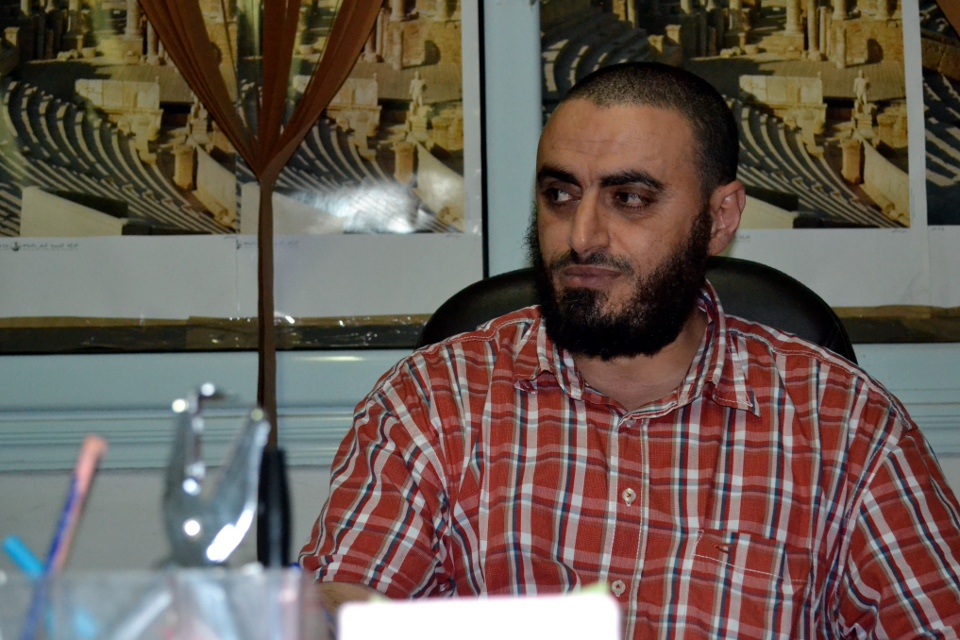By Mathieu Galtier.

Tripoli, 10 June, 2013:
Insecurity, the Isolation Law, Islamists, anti-Westerner attacks. In all these matters, the Tripoli Supreme Security Committee . . .[restrict](SSC) is more or less involved. But Hashim Bishr, the head of the organisation, rejects being portrayed as the villain of the story. As far as he is concerned, he is doing his duty keeping Tripoli secure.
Clothes don’t make the man. Dressed in a short-sleeved shirt and old blue jeans,and barefoot, Hashim Bishr, the head of Supreme Security Committee (SSC) in Tripoli, welcomes his guests at SSC headquarters at Mitiga Airbase in a very relaxed manner. Despites appearances, he is a busy man. Just before the interview, Bishr was in discussions with a delegation from Zintan. It is no surprise that what was discussed was not divulged.
He is busy because he is one of the most powerful and feared men in Tripoli. His organisation, legally recognised by the Ministry of the Interior, acts as a police force. It was officially created on October 2011 by the National Transitional Council (Order n°20) to fill the security vacuum at the end of the revolution. There is a second Tripoli SSC, the capital’s branch of the national SSC which was formed later. Both are legal and both have little to do with each other. Bishr’s outfit more powerful by far.
Despite the legality, there are people who complain that SSC is overly strong-handed in its operations and, consequently, adds to insecurity in Tripoli.
Hashim Bishr has some surprising views about the organisation he heads.
“The idea of SSC has been a bad one since the beginning. The SSC was created to enroll all those young Libyans who had a weapon (officially, the SSC was formed by “genuine” revolutionaries). Among them, there were drug dealers, smugglers, former prisoners released by Qaddafi during the revolution, and so forth. They joined the SSC to regain credibility. In many cases, it’s true that some people who perpetrate crimes are also members of SSC. You could consider the SSC as a mix of sheikhs, students and graduates from prison!”, he exclaims.
So, why not finally dissolve SSC? It was meant to have disappeared by now. It’s demise was announced last year, and Bishr said at the time that it would be wound up and that only a small handful of the 26,000 registered members last year would remain operational for a short while after the end of the year., and in purely an administrative role.
The reason it has not gone, Bishr explains, is that if it is not beyond reproach, it still plays a key role in providing security in the capital.
“We are the only ones to go out on the street when there are big issues like what happened in Gargaresh last time. The police didn’t move. So, it is normal that people say we are causing troubles.”
He insists though that the SSC hands criminals over to the police and that stories about secret jails managed by the SSC is nonsense. Yes, he says, the SSC can keep the most dangerous criminals in custody. But “usually, we keep them 48 hours here [at Mitiga SSC headquarter] and then we release them to judicial police before they are put on trial”, he told the Libya Herald.
For Bishr one of the main task of the organization now is the integration of former members into the regular security forces. “We are useful because we can say to ministries of Defense and Interior who will be a good element and who will not.”
He particularly insists on this last point, showing the four different type of application forms that SSC officials fill for each member:
• Those for members who have wanted to join the army or police (so far 6,000 of them have been trained);
• Those for members who are physically disabled but who can work in offices (more than 1,000);
• Those for members who do not want to work in security (3,000)
• Those for members who cannot work in security because they are too young, are former prisoners, drug dealers, or the like (350 people).
“This strategy has been devised with the Ministry of the Interior in July 2012, which issued decrees 180 and 200 about it”, Hashim Bishr says, laying emphasis on the legal aspects.
At present, Bishr says that only seven units out of the original 49 are still working, which represents 2,150 active members. It is a higher figure than the Interior Ministry claims.
According to him, the SSC should disappear in the next few months, “We are in discussion with SSC in Benghazi. We all agree to dissolve SSC very soon. There are only few technical problems to solve,” he says.
So what will Hashim Bishr do if and when the SSC disappears?
He is not going to become a politician, for sure. His feelings toward former top Libyan political figures are heavy with disappointment. Of Mohamed Magarief, he says: “He is not very important, just one among 200 others. Of Mahmoud Jibril: “ It is a good thing he was banned. I thought he was a good man but he disappointed me a lot after the revolution”. He accords approval only to Prime Minister Ali Zeidan – “a person we can talk to and find some agreements with”.
As expected, Hashim Bishr is a supporter of the political isolation law.
“The law is very important because we need new Libya with new people. The authorities should have passed the law from the very beginning to integrate the thuwars into the administration instead of considering them as criminals. » However, he criticises the circumstances in which the law was approved by Congress. The decisions of Misrata and Tajura’s brigades to lay armed siege to the ministries in his own territory of Tripoli evidently surprised him and still angers him. He raises his voice: “They were not obliged to come with weapons ! These people were not from Tripoli! “ When told that revolutionaries from Tripoli were interviewed in front of the Ministry of Foreign Affairs at that time, he flares up: “Maybe they are from Tripoli but they don’t belong to Tripoli brigades but from Misrata or Tajura!”
If politics offends, what about religious matters? One of the alleged reasons for the SSC’s prominence is that it is strongly linked to religious groups, especially the Salafis. The German Institute for International and Security Affairs issued a report named Fault Lines of the Revolution in May 2013 in which the author wrote: “The leadership of the Tripoli SSC is strongly dominated by Salafis – including its head, Hashim al Bishr . . .. »
A symbol of the Salafist influence in Tripoli was the destruction of Sufis shrines in August 2012. Several witnesses claimed that SSC members took part in the vandalism. Hashim Bishr replies: “Those who destroyed the shrines were from SSC but they did it not because there were SSC members but because they were Wahhabi followers. Personally, I stand at the opposite corner of these Wahhabis. But that day, when we came, the shrine was already destroyed. They were armed, we were armed, and it was not the right time to shoot at each other. So we asked them to leave, but buildings were already down.”
At the end at the interview, speaking about the latest attacks in Libya, Bishr feels more and more confortable. About the attack against the French Embassy in Tripoli on 23 April, he asserts that those responsible were from inside Libya, not outside. Similarly, he is sure that the failed attack on the British Council the same day was not linked to that on the French Embassy. “First, we thought both attacks were planed together but now we are sure that they (those responsible) don’t know each other.”
Who are “They”?
“Investigations are under way”, he simply replies.
Hashim Bishr does not dream of being a political national figure in the new Libya (at least, not publicly). He prefers staying behind the stage. He pictures himself working for the Intelligence service in the future. [/restrict]








